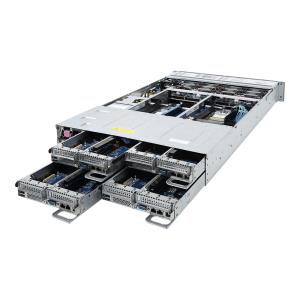

AMD EPYC Processors
The New x86 Option
AMD’s return to the CPU segment delivers a whole new value proposition to the x86 world. Built on GIGABYTE’s extensive design expertise across a range of chipset platforms, this AMD EPYC™ platform is already receiving acclaim for its high specification:
- Memory
- I/O
- Network connectivity
This platform is intended as an alternative for builders in the x86 space and packs a real punch in flexibility and expansion options.
Comprehensive I/O
Both single- and dual-socket CPUs come equipped with 128x PCIe lanes, providing extensive I/O options. This is a huge improvement in I/O vs. incumbent x86 offerings.
Increased I/O allows for flexibility in extending your storage, networking or compute to a level previously unattainable with standard server motherboards.
In addition, the integrated nature of the processor – designed as a system-on-chip (SoC) - means that there is no need for a separate PCH and less additional switches needed for expansion lanes.
CMC for Chassis Management & Multi-Node Monitoring
GIGABYTE’s H-Series Servers feature an Aspeed CMC (Central Management Controller) for chassis-level management and node-level monitoring (by connecting internally to Aspeed BMCs integrated on each node). This results only in one MLAN connection required to perform monitoring of all four nodes, resulting in less ToR (Top of Rack) cabling and switch connections.
Multi-Server Management
GIGABYTE’s H-Series Servers also feature the ability to create a “ring” connection for monitoring & management of all servers (incl. chassis-level & node-level) in a rack (including iKVM support) with an onboard LAN hub and dual MLAN ports. Only two ToR (Top of Rack) switch connections are needed to create the ring system, and the ring will not be broken even if one server in the chain is shut down, reducing cabling and switch port usage for greater cost savings and management efficiency.
Dense, High Speed Storage Support
Onboard M.2
GIGABYTE AMD EPYC™ platforms are designed to support on-board ‘M.2’ storage devices for time-sensitive operations and leaves room on the standard storage for compute tasks. Delivering up to 32 Gb/s data transfer speeds, M.2 offers users considerably faster storage performance than current mSATA devices.
Data Security
TPM 2.0 Module
GIGABYTE’s EPYC™ platform is designed to support Trusted Platform Modules (TPM - discrete cryptographic on-board processors).
Carefully Selected Components
GIGABYTE’s passive components are carefully selected to guarantee a stable operating environment and allow the processors and the memory to deliver their maximum performance. GIGABYTE’s server motherboards are built with long lasting components for a high degree of reliability and durability.
Ease of Deployment and Management
GIGABYTE continues to be responsive to market needs and to create user-friendly solutions, including:
- Tool-less rail kit included as a default across all new server models
- Supplying multiple connector options and tools where appropriate
Efficient, Reliable Power Supply
GIGABYTE SERVER AMD EPYC servers are designed to guarantee high conversion efficiency regardless of load. Redundant 80 Plus ‘Titanium’ or ‘Platinum’ PSUs, combined with GIGABYTE’s precision engineering, translates to super efficient power usage which maximizes the system’s power : performance ratio and reduces OPEX for the user.
Intelligent Power Management Features
Cold Redundancy
To take advantage of the fact that a PSU will run at greater power efficiency with a higher loading, GIGABYTE has introduced a power management feature called Cold Redundancy for servers with dual PSU. When the total system loading falls lower than 40%, the system will automatically place one PSU into standby mode, enabling the other PSU to take over the greater load. This can enable total system power efficiency savings of up to 10%.
SCMP (Smart Crises Management / Protection)
SCMP is a GIGABYTE patented feature that will automatically force the system’s CPU to enter ULFM (ultra-low frequency mode for minimum power consumption) when the BMC is alerted to a PSU fault or error (such as power loss, power surge, overheating or a fan problem). This feature will prevent shutdown in systems with less than 1 + 1 PSU redundancy when one PSU is lost. In a 2U 4 Node server, only two nodes will be switched to low power mode, while two remaining nodes can continue normal operation. When the fault is resolved or the PSU is replaced, the system will automatically return to normal power mode.
N
Socket SP3
8
16
DDR4-SDRAM
2133,2400,2666 MHz
Octa-channel
Y
24
2.5"
Aspeed AST2500
Y
Gigabit Ethernet
10,100,1000 Mbit/s
Intel® I350-AM2
8
4
4
1
8
Y
Y
Rack (2U)
Black
Y
Y
Y
8 fan(s)
8 cm
2200 W
Y
2
80 PLUS Platinum
10 - 35 °C
-40 - 60 °C
8 - 80%
20 - 95%
440 mm
820 mm
87 mm
1167 mm
309 mm
700 mm